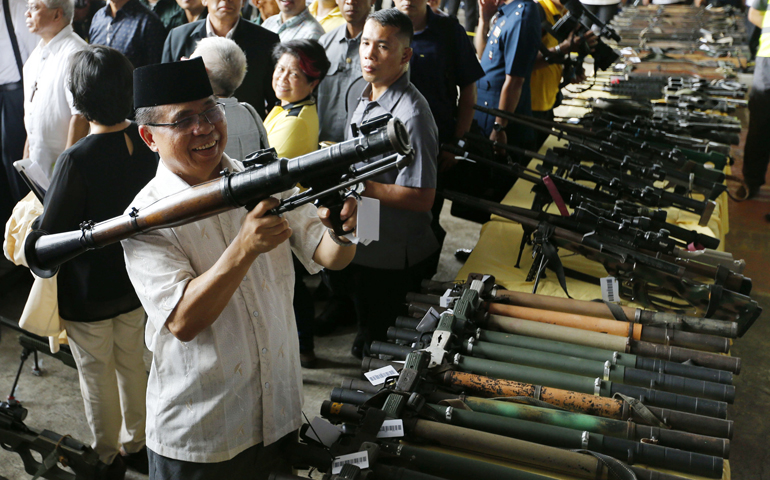
Moro Islamic Liberation Front Chairman Al-Haj Murad Ebrahim holds a surrendered rocket-propelled grenade launcher Tuesday during the first phase of the decommissioning of rebel weapons in Maguindanao, Philippines. (CNS/EPA/Ritchie B. Tongo)
The Philippine government on Tuesday started the Catholic church-backed process of decommissioning members of the country's largest Muslim rebel group.
The process was bringing the Moro Islamic Liberation Front a step closer to its goal of self-determination, after more than four decades of fighting. But the effort still must contend with Christians who are anxious about a proposed law that would create a self-governing region in the country's Muslim-majority south.
Cardinal Orlando Quevedo of the Cotabato archdiocese, which includes the Moro Islamic Liberation Front stronghold, shared the opening prayer prior to the decommissioning ceremony with the rebels' grand mufti, Abu Hurraira Udasan.
"Your peace, almighty God, is the peace of the heart, the peace that reconciles heart with heart, the peace that is based on mutual respect, understanding and total trust and fundamentally the peace that is based on love," Quevedo prayed.
"This is the meaning that we mean to give in this event today, one big step in the gradual process of decommissioning that is so essential to the peace process."
Quevedo is former president of Notre Dame University in Cotabato City, which some of the ranking rebels attended. He has been a strong advocate of helping in their efforts at self-determination. The cardinal said the Cotabato archdiocese is 47 percent Muslim and 48 percent Catholic.
He told Catholic News Service that he sees the rebels' sincerity in the decommissioning process.
"They want to fulfill that they no longer need the guns, so why bear guns," he said.
The Moro Islamic Liberation Front's fight with the government has left more than 120,000 dead and millions displaced. Both sides negotiated off and on over 17 years until they signed an initial peace agreement in 2012. That was fleshed out into a comprehensive pact signed last year. The decommissioning is among its terms.
At the ceremonial turnover of weapons in an airless gymnasium of the old capital grounds in Sultan Kudarat, 145 fighters also went through a registration process that is supposed to help them integrate into society. More than 10,000 members of the Moro Islamic Liberation Front's armed forces will go through the program.
Officials said $53 million would help fund livelihood and skills training for former fighters. It will also go toward college scholarships and help in finishing high school.
"I think decommissioning is of great significance to dialogue with Muslims," Quevedo said. But he voiced concern that a January gun battle between police commandos and Moro Islamic Liberation Front fighters -- which left 44 commandos and 18 rebels dead -- stirred up old Christian/Muslim prejudices.
The police Special Action Force was in the rebel area in nearby Mamasapano to arrest suspected international terrorists they believed were being harbored by a Moro Islamic Liberation Front breakaway group. That group, the Bangsamoro Islamic Freedom Fighters, does not want peace with the government. Moro Islamic Liberation Front officials said the police did not coordinate with the ceasefire monitoring body before entering their turf. Police said their men were ambushed by the rebels in the pre-dawn raid.
"The beginnings of interreligious dialogue with regard to this peace, that collapsed," Quevedo said.
The bloody 12-hour fight cast doubt on efforts to create an autonomous region in the Muslim-majority part of Mindanao Island in the south. Some lawmakers questioned the constitutionality of the proposed Bangsamoro Basic Law.
Quevedo said in his archdiocese, he senses Christians oppose the law as it was originally submitted by the peace negotiators. But he said the sentiment is based on misinformation, perpetuated by what he said was the one-sided local reporting of the Mamasapano incident.
Cherrymae Cua, a Catholic who was born and raised in Cotabato, said the government carrying out the decommissioning process while the measure is in doubt, was "a big show" to gain support for the Bangsamoro law.
"I feel like even without the law being realized, Muslims are behaving like they're in charge," said Cua, 23. "And the more each part of the peace process is accomplished, the more they strut around."
The Independent Decommissioning Body, made up of foreign, government and Moro Islamic Liberation Front monitors is registering weapons and overseeing their safekeeping.
Moro Islamic Liberation Front Chairman Al-Haj Murad Ebrahim told reporters after the ceremony that if the Bangsamoro law does not pass, the decommissioning program will stop. He did not say whether there would be a return to fighting.


